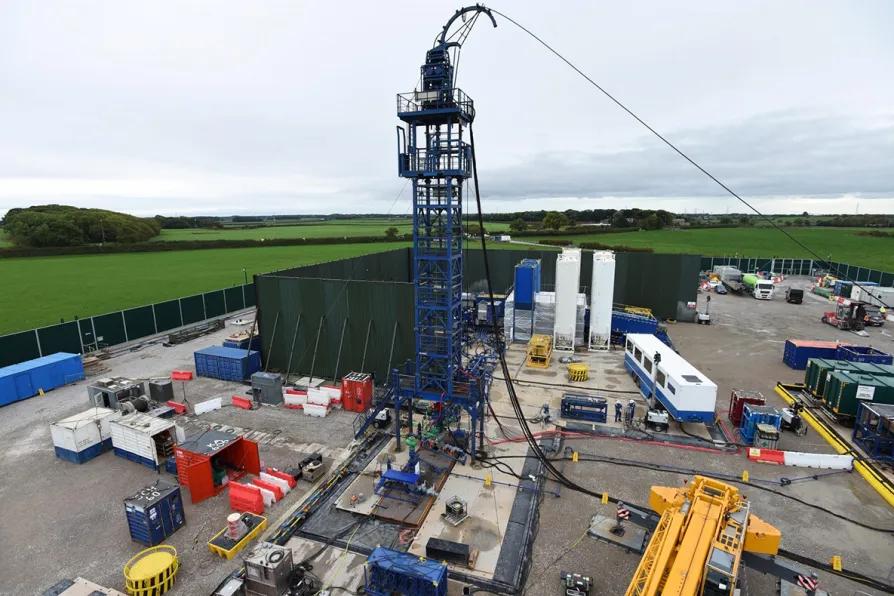
 The Cuadrilla hydraulic fracturing site at Preston New Road shale gas exploration site in Lancashire
The Cuadrilla hydraulic fracturing site at Preston New Road shale gas exploration site in Lancashire
ACTIVISTS slammed the lifting of the fracking ban in England as a “charter for earthquakes” today as Prime Minister Liz Truss faced a backlash from all parts of Parliament.
In an urgent question to the government, shadow climate change secretary Ed Miliband called on Secretary of State Jacob Rees-Mogg to “admit the truth that anyone who knows anything about this subject says his claim that fracking will cut bills is nonsense.”
Mr Miliband accused the Tories of lifting the ban with no evidence it was safe to do so.
Labelling the plans a “charter for earthquakes,” Mr Miliband added: “Let me tell the party opposite: we will hang this broken promise around their necks in every part of the country between now and the next general election.”
Mr Rees-Mogg said fracking was in the national interest and would make the country richer.
He suggested current limits on acceptable levels of seismic activity are too restrictive and said the government is determined to “realise any potential sources of domestic gas.”
Regulations require work to stop if tremors above 0.5 on the Richter scale are detected.
But Mr Rees-Mogg said he wanted that lifted to as high as 2.5.
He told MPs: “There are millions of seismic events of 2.5 or lower in the world every year, we should not assume that every seismic event is the San Francisco earthquake.”
Tory backbenchers also hit out at the plans to lift the moratorium which was put in place in 2019 following a series of earth tremors.
East Yorkshire MP Greg Knight told the Secretary of State that forecast earthquakes as a result of fracking remained a challenge for experts, adding: “The safety of the public is not a currency in which some of us choose to speculate.”
Tory MP Mark Menzies said if the Prime Minister “is to remain a woman of her word,” then the government needs to set out how local consent over fracking will take place
Responding to Mr Rees-Mogg’s suggestion that opposition to his plans was “ludditery,” Mr Menzies, who represents Fylde, said: “There is nothing luddite about the people of Lancashire or of Fylde.
Islington North MP Jeremy Corbyn said it was a mistake to lift the ban on fracking and instead there should be more “focus on investment in sustainable and renewable energy sources — not this dangerous and damaging practice.”
Green Party MP Caroline Lucas said: “I’m fascinated that the Secretary of State thinks that he knows more about the geology of the UK than the geologist who founded Cuadrilla.”
Chris Cornelius, who founded fracking firm Cuadrilla, wrote in the Guardian on Tuesday that fracking would not work in Britain.
Former Labour minister Dame Angela Eagle said: “I take it a bit rich from the self-styled minister for the 19th century that he thinks the CEO of Cuadrilla is out of date.”
Mr Rees-Mogg said: “The former chief executive of Cuadrilla resigned 10 years ago. He does not represent the company.”
But Katie White, from the conservation group World Wildlife Fund, said: “Today’s fracking announcement is a clear breach of a manifesto promise and has no scientific, economic or environmental legs to stand on.”
Energy union GMB has criticised Labour’s opposition to fracking. National secretary Andy Prendergast said yesterday it would create “thousands of jobs” and profits could be invested in developing carbon-neutral technologies.
Mr Rees-Mogg caused further controversy during the debate when he said: “There have been stories widely reported that some of the opposition to … fracking has been funded by Mr Putin’s regime.”
Mr Miliband later tweeted: “Absolutely outrageous slur by Jacob Rees-Mogg that people who object to fracking are funded by Putin. Shameful and disgraceful.”

While much attention is focused on Israel’s aggression, we cannot ignore the conflicts in Africa, stoked by Western imperialism and greed for natural resources, if we’re to understand the full picture of geopolitics today, argues ROGER McKENZIE

















